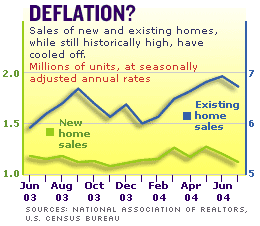NEW YORK (CNN/Money) -
The nation's housing boom has experienced more deaths and shocking resurrections than Friday the 13th monster Jason Voorhees.
| 
| |

| 
| 
|

|
 Sin City's housing market has appeared unstoppable with soaring home prices and an influx of new residents. CNNfn's Gerri Willis takes a peek. Sin City's housing market has appeared unstoppable with soaring home prices and an influx of new residents. CNNfn's Gerri Willis takes a peek.
|
 Play video
Play video
(Real or Windows Media)
|
| 
|

|
|
But it's suffered a series of blows lately that has some analysts wondering if the boom is finally dead for good. If so, there could be significant implications for the rest of the economy.
"The housing market has carried us for five years," said Wellesley College economics professor Karl Case, who has published several influential studies of the housing market with Yale economist Robert Shiller. "As that carrying goes away, it will have an impact."
First, the nation's hottest housing markets are cooling off. CNN/Money reported Wednesday that the Las Vegas market, which posted the biggest price gains in the second quarter, is suddenly dead in the water.
Last week, real-estate tracker DataQuick said home sales in Orange County, Calif., the No. 2 U.S. market, slumped 17 percent from a year ago. The No. 3 market, Riverside-San Bernardino, Calif., was holding up very well, thank you, but sales fell in San Diego and Los Angeles, No. 4 and 5, respectively.
This week, the National Association of Realtors (NAR) said sales of existing homes, the biggest sector of the housing market, fell in July -- though the pace of sales was still the third-highest on record.
The Commerce Department said Wednesday that new-home sales fell more than expected in July, and it revised down its estimate of May and June sales, leading some analysts to say the boom was good and dead this time.
"A sizeable two-month decline in new home sales likely means that the long-awaited move back toward a more sustainable rate of housing activity has begun," Lehman Brothers economist Drew Matus wrote in a note to clients Wednesday.

What is notable, however, is that sales fell even as mortgage rates declined, dipping below 6 percent again in recent weeks, causing a spurt of last-minute refinancing and purchase applications. But applications tumbled last week.
That could be a sign that most, if not all, the fence-sitters have finally made their move, in anticipation of higher rates. The Federal Reserve has already raised its key overnight lending rate twice and promised more rate hikes to come.
"People waiting for rates to fall have been squeezed out of the market," said Jason Schenker, economist at Wachovia Securities. "We're not going to see housing sales plummet, but we will see sales moderate."
"It's also possible that housing prices could slide back somewhat," he added. "I don't think they will plummet, but a slight pullback is within the realm of the reasonable."
Home prices don't often fall nationwide. It last happened to new home prices in 1991, and things were considerably different then, with home builders throwing up new houses, hoping buyers would come along. The oversupply, which stretched back to the late '80s, helped sink prices, but no such oversupply exists today.
Yet home builders were certainly out of sync with the market in July. Housing starts posted their biggest gain in July since September 2002. The supply of new homes on the market, though still quite low historically, rose in July to its highest level since February 2003.
Meanwhile, the S&P 500 Homebuilders Index, which includes Lennar (LEN: Research, Estimates), Centex (CTX: Research, Estimates) and Pulte Homes (PHM: Research, Estimates), has jumped 13 percent in the past month, far outperforming the broader S&P 500.
Shares of homebuilders did fall after the new-home sales report Wednesday, but they recovered Wednesday afternoon and Thursday morning.
| Weekly rate information
|

|
|
|
|
"This suggests one of two things: either investors are unduly optimistic about the sector, or more ominously, perhaps, the homebuilders are seeing strong demand from non-traditional buyers," said Michael Panzner, head of sales trading at Rabo Securities USA. "In other words, real estate speculators have moved into the market, replacing owner-occupiers as the primary end-buyers."
"Whatever the case, it seems to lend credence to the notion that a bubble has been developing in the residential real estate sector," he added.
Who gets soaked?
Most economists doubt there is a national housing bubble about to pop. There seem to be bubbles in hot markets such as Vegas and Orange County, but most analysts hope the declines in those markets will have little impact on the rest of us, aside from maybe making their TV shows a little less glamorous.
Other economists aren't so sure. For one thing, the economy's recent health has been supported by a hot housing market. Refinancing put a ton of cash in consumers' pockets, and high home values made people wealthier. And several industries, from construction to furniture to finance, rely heavily on the housing market.
And prices don't have to plunge to make a noticeable impact on these sectors of the economy.
Paul Kasriel, chief economist at Northern Trust, has noted that U.S. banks are heavily exposed to the housing market, with about 60 percent of their assets tied up in home financing of one sort or another, the highest since World War II.
"If the U.S. housing market goes bust, the U.S. banking system is likely to fall on very hard times as the value of all that housing collateral drops," he wrote in a recent note. "History suggests that as goes a nation's banking system, so goes its economy."

|

